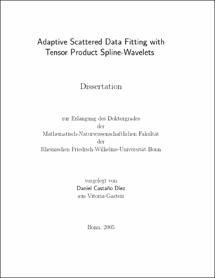Castaño Díez, Daniel: Adaptive Scattered Data Fitting with Tensor Product Spline-Wavelets. - Bonn, 2005. - Dissertation, Rheinische Friedrich-Wilhelms-Universität Bonn.
Online-Ausgabe in bonndoc: https://nbn-resolving.org/urn:nbn:de:hbz:5N-04880
Online-Ausgabe in bonndoc: https://nbn-resolving.org/urn:nbn:de:hbz:5N-04880
@phdthesis{handle:20.500.11811/2254,
urn: https://nbn-resolving.org/urn:nbn:de:hbz:5N-04880,
author = {{Daniel Castaño Díez}},
title = {Adaptive Scattered Data Fitting with Tensor Product Spline-Wavelets},
school = {Rheinische Friedrich-Wilhelms-Universität Bonn},
year = 2005,
note = {The core of the work we present here is an algorithm that constructs a least squares approximation to a given set of unorganized points. The approximation is expressed as a linear combination of particular B-spline wavelets.
It implies a multiresolution setting which constructs a hierarchy of approximations to the data with increasing level of detail, proceeding from coarsest to finest scales. It allows for an efficient selection of the degrees of freedom of the problem and avoids the introduction of an artificial uniform grid. In fact, an analysis of the data can be done at each of the scales of the hierarchy, which can be used to select adaptively a set of wavelets that can represent economically the characteristics of the cloud of points in the next level of detail. The data adaption of our method is twofold, as it takes into account both horizontal distribution and vertical irregularities of data. This strategy can lead to a striking reduction of the problem complexity. Furthermore, among the possible ways to achieve a multiscale formulation, the wavelet approach shows additional advantages, based on good conditioning properties and level-wise orthogonality. We exploit these features to enhance the efficiency of iterative solution methods for the system of normal equations of the problem. The combination of multiresolution adaptivity with the numerical properties of the wavelet basis gives rise to an algorithm well suited to cope with problems requiring fast solution methods.
We illustrate this by means of numerical experiments that compare the performance of the method on various data sets working with different multi-resolution bases. Afterwards, we use the equivalence relation between wavelets and Besov spaces to formulate the problem of data fitting with regularization. We find that the multiscale formulation allows for a flexible and efficient treatment of some aspects of this problem. Moreover, we study the problem known as robust fitting, in which the data is assumed to be corrupted by wrong measurements or outliers. We compare classical methods based on re-weighting of residuals to our setting in which the wavelet representation of the data computed by our algorithm is used to locate the outliers.
As a final application that couples two of the main applications of wavelets (data analysis and operator equations), we propose the use of this least squares data fitting method to evaluate the non-linear term in the wavelet-Galerkin formulation of non-linear PDE problems.
At the end of this thesis we discuss efficient implementation issues, with a special interest in the interplay between solution methods and data structures.},
url = {https://hdl.handle.net/20.500.11811/2254}
}
urn: https://nbn-resolving.org/urn:nbn:de:hbz:5N-04880,
author = {{Daniel Castaño Díez}},
title = {Adaptive Scattered Data Fitting with Tensor Product Spline-Wavelets},
school = {Rheinische Friedrich-Wilhelms-Universität Bonn},
year = 2005,
note = {The core of the work we present here is an algorithm that constructs a least squares approximation to a given set of unorganized points. The approximation is expressed as a linear combination of particular B-spline wavelets.
It implies a multiresolution setting which constructs a hierarchy of approximations to the data with increasing level of detail, proceeding from coarsest to finest scales. It allows for an efficient selection of the degrees of freedom of the problem and avoids the introduction of an artificial uniform grid. In fact, an analysis of the data can be done at each of the scales of the hierarchy, which can be used to select adaptively a set of wavelets that can represent economically the characteristics of the cloud of points in the next level of detail. The data adaption of our method is twofold, as it takes into account both horizontal distribution and vertical irregularities of data. This strategy can lead to a striking reduction of the problem complexity. Furthermore, among the possible ways to achieve a multiscale formulation, the wavelet approach shows additional advantages, based on good conditioning properties and level-wise orthogonality. We exploit these features to enhance the efficiency of iterative solution methods for the system of normal equations of the problem. The combination of multiresolution adaptivity with the numerical properties of the wavelet basis gives rise to an algorithm well suited to cope with problems requiring fast solution methods.
We illustrate this by means of numerical experiments that compare the performance of the method on various data sets working with different multi-resolution bases. Afterwards, we use the equivalence relation between wavelets and Besov spaces to formulate the problem of data fitting with regularization. We find that the multiscale formulation allows for a flexible and efficient treatment of some aspects of this problem. Moreover, we study the problem known as robust fitting, in which the data is assumed to be corrupted by wrong measurements or outliers. We compare classical methods based on re-weighting of residuals to our setting in which the wavelet representation of the data computed by our algorithm is used to locate the outliers.
As a final application that couples two of the main applications of wavelets (data analysis and operator equations), we propose the use of this least squares data fitting method to evaluate the non-linear term in the wavelet-Galerkin formulation of non-linear PDE problems.
At the end of this thesis we discuss efficient implementation issues, with a special interest in the interplay between solution methods and data structures.},
url = {https://hdl.handle.net/20.500.11811/2254}
}






